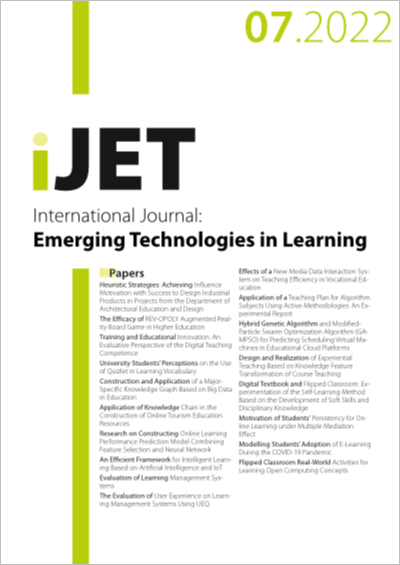Design and Realization of Experiential Teaching Based on Knowledge Feature Transformation of Course Teaching
DOI:
https://doi.org/10.3991/ijet.v17i07.30403Keywords:
course teaching, knowledge feature transformation, experiential teachingAbstract
Experiential teaching, which combines real environment with virtual environment, helps students understand and internalize knowledge. To a certain extent, the organization and design of experiential teaching can promote the education reform in the new era. The existing studies on experiential teaching mostly emphasize theoretical applications, without paying much attention to teaching process and practical methods. Therefore, this paper designs and realizes experiential teaching based on knowledge feature transformation of course teaching. Firstly, node betweenness was selected as the reference metric for allocating the initial granularity importance to the knowledge points of physical education (PE) course teaching, and the macro-importance of the course was proportionally allocated to the known granularity of knowledge points. Next, a knowledge network was established for PE course teaching, and the named entities were identified based on course teaching knowledge features. The purpose is to extract the knowledge points of experiential PE teaching units, with class hour as the unit, and to determine their teaching sequence. After that, the design frameworks were established for experiential teaching scenarios and experiential learning activities, and the course evaluation strategy was provided for students majoring in sports dance, a professional PE course. Experimental results show that our approach achieves excellent effects on designing and implementing experiential learning activities.
Downloads
Published
How to Cite
Issue
Section
License
Copyright (c) 2022 Nan Zhang (Submitter); Hongying Shi, Xuhong Meng, Juan Du, Lin Wang

This work is licensed under a Creative Commons Attribution 4.0 International License.



